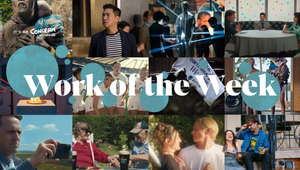
Creating a ‘Content Symphony’ with Human-Machine Collaboration and Strategic Storytelling

While industry headlines are dominated by debates about the impact of AI, Tanya Grimson is utilising it among her team to boost efficiency and creativity - she wants more teams across the industry to start doing the same. With Accenture Song since 2021 in the role of head of content and publishing, Tanya’s experience spans 20 years of working in media, publishing, and across all of the content ecosystem’s touchpoints. As such, Tanya has seen how the content explosion has brought confusion (though undoubtedly benefits too) to brands and marketers alike. “The shape of content has undergone a massive transformation in the last 10 years and in the last five the change is most notable in the focus on digital activation and highly personalised dynamic digital ecosystems and conversations,” says Tanya. “What consumers need right now is relevance.”
In 2023, the industry is changing rapidly once more thanks to generative AI like ChatGPT and Midjourney. Some see this development as a friend, others as a foe. For Tanya, this is one of four key trends that marketers need to learn about and embrace for the year ahead to continue to create content that resonates with their target audience. Getting the human-machine collaboration right is crucial and it’s exactly that relationship that will enable marketers to implement a harmonious ‘content symphony’.
Jonas Peterson is photographer, filmmaker and visual artist working with CGI and AI.
Harmonious Collaboration: Humans and Machines Racing Together, Not Against Each Other
Artificial intelligence is here and it’s here to stay, with Tanya stressing that it’s not a fad. Think of the way we adopted ‘Google’ to be a verb synonymous with ‘search’; software systems like ChatGPT will soon follow suit as their capabilities become interwoven into the daily fabric of our lives. A report recently launched by Accenture Song, Life Trends 2024, shows that the vast majority of the customers have heard of generative AI, despite it being such a new technology. With 77% of people familiar with conversational AI, this is a technology with mass cultural awareness.
In professional settings, artificial intelligence can help - and already is - to augment human capabilities. “I've been a creative for over 20 years. So, it's not about AI taking away that creativity, it's actually helping me come to an idea faster and allowing me to build on that initial idea.”
AI is then a “facilitator, an enabler” but Tanya is also conscious that it presents challenges. “It’s making marketers radically revaluate their strategies and processes. It’s also instilling some fear with businesses unsure as to how to best implement this new technology to benefit them.” She calls for more education and understanding of what the technology can do while reiterating that the need for human creativity to wield these new capabilities is stronger than ever, which should usher in excitement and displace fears. “I don’t think AI is changing the game, but it is changing how we’re playing it. People should be asking how this technology is going to enable more creativity by speeding up or automating the inefficient and tedious parts of work.”
“The creative vision can never be replaced - it all stems from the human mind and no technology will be able to replace its intricacies and nuances.” If anything, Tanya thinks the availability of AI-created content will put the emphasis back on quality and on creative that cuts through the noise. “It will force the industry to become more resourceful, innovative, and creative with its storytelling.”
Embracing Simplicity: Rethinking Content Overload for Strategic Impact
In a noisy digital landscape, ‘more is more’ is not a strategy that will deliver the best results for brands. The task today isn’t how to produce the most content - which AI can certainly help with - but how to produce the most relevant content for the most relevant channels. It’s time to really consider “strategically curated content”, according to Tanya with a focus on quality over quantity. “Businesses have spent a lot of time thinking about the volume of content needed. What I haven’t seen much of is businesses pausing to ask why they’re producing the content and looking at the impact it has or how it makes people feel.” Tanya thinks that businesses need to stop and establish “a strategy that aligns their content needs with business objectives” because content marketing without a strategy is never going to help businesses achieve their aims. She adds that it’s vital to track the content in the right way, which she’s not seeing a lot right now.
“There’s a lot of content fatigue. Customers want personalised content that goes further than addressing them by name. They want something relevant, something that inspires an emotional reaction, and an action to take. We need to start seeing more of a strategic approach to content to make it happen.”

Above: images Tanya created using DALL-E 3 AI
Unlocking Potential: Automation and Martech Tools in Content Creation
With a greater than ever need for a strategic approach to content and a growing implementation of AI across businesses, there’s a lot of untapped potential that abounds in the industry. “Some of the biggest brands are turning to Accenture Song because they realise that they don't have the ability, the process, the teams, and the time resource to actually fix a very fractured content ecosystem.”
The roles within marketing are undergoing an evolution. “In the past, the roles were very defined - copywriter, visual storyteller, editorial. That’s changing and we’re now seeing a need for more hybrid roles as technology meets creativity and an understanding of both is needed to meet demands,” Tanya says. Multi-disciplinary thinking is going to reign in the year ahead but companies should be investing in training, especially when it comes to the technical side. “If someone was joining my team, I would make sure they’re getting training on martech tools and their implementation.”
‘Prompting’ is another emergent skill and there’s an art to a good prompt to get gen-AI to produce the right image and/or copy. “It’s fascinating because no two people will get the same result, and nuance really helps with getting the most from AI.”
Storytelling: Transforming Transactions into Advocacy
Transactions are fleeting but brand advocates last a lifetime. Tanya notes that brand advocates give brands the best free advertising there is, spreading that brand love to friends, their community, and sometimes even the next generation. “If you can create a positive experience for your consumers, if you understand them, and then give them really powerful pieces of communication back through storytelling, those advocates are ultimately going to become your influencers,” she explains. There’s no blueprint for achieving this as every brand has to find its USP and a way of storytelling to authentically express it. Capturing the consumer’s imagination is only possible through “emotive stories that connect with people at heart. It’s not a piece of content that is simply aiming to sell you something with a catchy tagline,” cautions Tanya.
“Marketers and brands need to really understand their audience and what motivates them, then bring that story to life. That's where the biggest impact and engagement is seen.” Storytelling, therefore, is distinct from blanket communication - it’s a strategy aimed at creating and maintaining an emotional connection with an audience and, hopefully, turning that audience into brand advocates in the process. By shifting the focus away from mere transactions, brands can tap into the emotional qualities of storytelling needed to build the trust, brand loyalty, and long-term customer relationships that they really want.
All marketers looking to succeed for the remainder of the year, in 2024 and beyond should familiarise themselves with these pivotal content trends shaping the industry. It’s only by consciously engaging with and embracing what really resonates with audiences - with some helpful assistance from AI - that brands and marketers will make a lasting impact in a fragmented and noisy content ecosystem.















